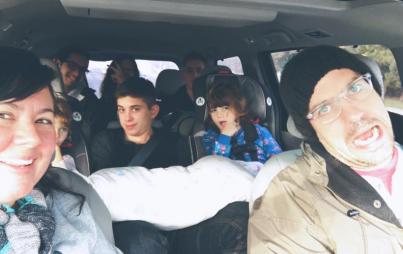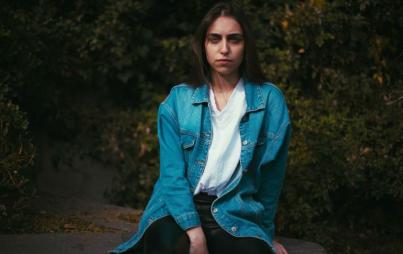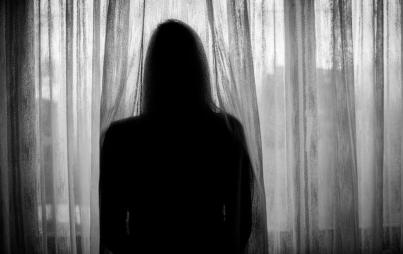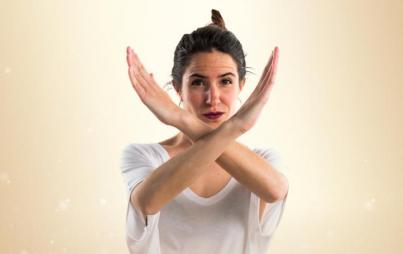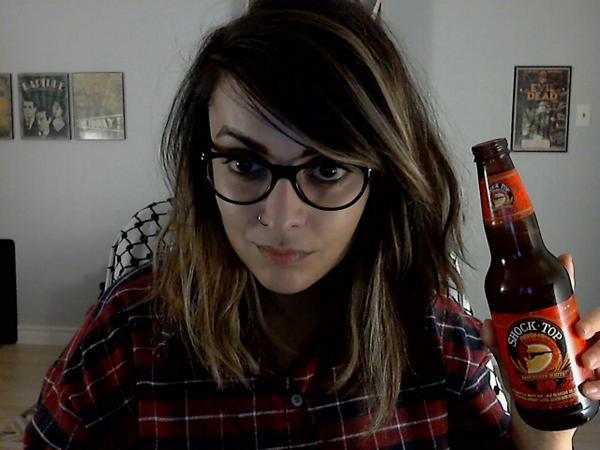
Credit: Twitter
Lavish your adoration onto my friends, the rad lady and gender non-conforming folk who make up the resistance against #Gamergate. Checkout my other interviews, with Toni Rocca, Leigh Alexander and Aevee Bee, by clicking on the little purple words.
For a minute there, I thought #GamerGate had died. A bloated firestorm of sound and fury had been shrugged off into the ether, and all that remained were pictures of Soha Kareem and her cat, Garnet.
This was Soha's activism: compassionate and mischievous. She had painted a tunnel onto a boulder and I walked right through it in my haste and found myself in #GarnetGate, a hashtag devoted to her cat. The most minute of nudges towards absurdity, but in those seconds I felt safe and free and no one was calling me a cunt and it was wonderful. It was a reminder: spaces are unsafe and spaces are toxic but we can leave them if we need to. Sometimes.
There is—to put it as a misconception expects too much from them—an omnipresent accusation from anti-"social justice" types that we "social justice warriors" only thrive in echo chambers, repeating the same thoughts and ideas amongst ourselves.
Well son, let me tell you: some of what I have learned from Soha, about abuse, about Islamophobia, about complicity in white supremacy, has shaken and jarred my understanding of the world so much more than any dilettanting devil's advocate.
She casts a gracious but unflinching gaze onto real shit.
The lessons we learn in our "course of work" are harsh, and at times expose us to "romantic encounter" levels of vulnerability. It is not a conspiracy, but a foxhole. I have stayed up until 2 in the morning, screenshotting Soha's game reProgram because I needed proof that I wasn't the only person who felt so small and passive in their own recovery from abuse. Many a freelance article was pretty-pleased into a deadline pushed back because I spent what felt like hours, scrolling through her coverage and commentary of the raids on Gaza, sometimes forgetting to breathe.
"Crazy" women gravitate towards each other under pressure because we feel safe in the bareness of our damage.
Soha's writing itself, in its unwillingness to accomodate or coddle privileged guilt, may not be "safe" to read to some, but she is, to me, a curator of safe space for women in games. Sometimes this means taking replacing the games with cats while you check to see if your shoe's untied.
Video games are not always a safe place to be for a muslim woman. How do you navigate when to do/make something "for you" and when to do/make something to resist and critique? Is there an overlap?
So I think it’s important to start by clarifying that I don’t currently practice Islam, but used to as a kid growing up. That relationship severed when I was a tween, and I would consider myself to be agnostic at this point in my life.
However! I still think I can answer this question. (Or, hope I can still answer this question.) I think I’ve discovered over the years that I only know how to create work as a means of creating a mini-resistance or critique. I see all of my work as an overlap and hardly are the intentions mutually exclusive.
Even in mundane, academic work I find that resisting some larger narrative tends to bleed into my work and writing that I can’t escape it. Must be the whole “being raised Arab” thing. Even when we agree, we’re loud and angry-sounding about it.
I got so excited to delve into social justice stuff that I forgot this part: how did you get into games?
In 1995, my parents got our first family-PC and with it came Doom 2, Laura Bow 2: The Dagger of Amon Ra, and Prince of Persia. From that age I was pretty into video games (I was 6), but coming from a lower socioeconomic status I mostly just re-played Nintendo games on my N64 with one of my sisters (and eventually PS2 with very limited games) until I had my own job and purchased a PS3.
It wasn’t until my PS3 that I began looking at games more critically since, at the time, I was completing my BA in Film Studies and was fascinated by what we could do with games as an artistic medium.
You have an M.A. in Photographic Preservation. What role does such a media and academic discipline play in your work as a writer and critic? Also, what is photographic preservation?
Photo preservation is the process of archiving, cataloguing, and preserving film and photographic objects!
It flirts with restoration and conservation but is generally about physically handling and caring for old fragile photos that would otherwise disintegrate in every day environments. In general I have such a love/hate relationship with academia because it can be such a soul-sucking experience that only upholds a classist status quo, but it’s also taught me how to think critically in hopes to break those barriers.
I’ve always hoped to find myself “working in the system” in order to burst through them, some sort of “HA! TAKE THAT, SHITBAGS!” moment.
My thesis moved away from photo history and photo preservation as much as possible, and maybe I like seeing that as some sort of defiant act, although that’s an incredibly boring way to be rebellious.
The thesis did help me reconsider some of the structure I use to format the games I’ve made. It was about using interactive, play-based interfaces in order to exhibit old photographs in an art institution, like a museum or gallery. In many ways, that’s kind of been my relationship with making games, in that I like using an interactive medium or format to move through static words and imagery. At least, that’s what I like to tell myself besides coming to terms with the fact that I’m quite shit at animation.
I don't mean to overlook or brush aside your identity as a Palestinian woman, or to make the assumption that everyone reading this understands Islamophobia within tech/games. I would like to make this space available for you to talk more about your identity in that context—if you would like.
I’m learning that topics of identity are heavily policed by what’s acceptable and unacceptable to discuss. While we’re still in need of a lot of improvement, we’re at least able to bring in conversations regarding gender and sexuality into games and have it be celebrated.
There is still a lot of friction and I won’t deny the endless harassment and sexism that women have received, but it hasn’t been in the same way that I’ve experienced friction regarding race (and others regarding class and disability).
To be frank, I’ve burned a lot of bridges within the games industry when I talked about my experiences as a Palestinian, and when I publicly disagree with the actions of the Israeli government. Calling out whiteness has also been a wake-up call in how toxic activist communities can be towards people of color
Many people ask me to talk about my experience in games making or writing from the perspective of my gender, and when race is brought up, it’s immediately disregarded as somehow unaffected or unimportant in games. This is largely what pushed me to incorporate different marginalized voices in the games and tech circles I travel through, and has been an incredible, albeit fatiguing, learning lesson.
Share with me a line from a poem that is affixed and ever-present in your consciousness. When did you first read it? What does it mean to you?
Shit, let’s get real depressing for a moment. (Apologies in advance for this being the whole poem, and not a line):
Oh rascal children of Gaza.
You who constantly disturbed me
with your screams under my window.
You who filled every morning
with rush and chaos.
You who broke my vase
and stole the lonely flower on my balcony.
Come back,
and scream as you want
and break all the vases.
Steal all the flowers.
Come back . . .
Just come back . . .
—"Oh Rascal Children Of Gaza" by Khaled Juma
This was written by Palestinian poet Khaled Juma in July when Gaza was repeatedly bombed. I admittedly don’t have much experience in reading poetry as I’m more of a prose-person, but this poem haunts me, and will continue to for a very long time.
reProgram has a lot to say, or at least said a lot to me, about confronting lies—those of society and those we tell ourselves. BDSM, like games, has some issues with unchecked racism and misogyny. There is a lot of room, between the two, to be lied to. How do you hold onto your truth?
I really like that connection and it hasn’t occurred to me to think of reProgram in that way.
My truth has been sustained through active, informed, safe discussions with partners. I’m brutally honest about my boundaries and that absolutely flows between kink and activism in games.
Any conversation (or session) that I don’t want, it doesn’t happen. And that has been very freeing in keeping myself active and true in my work.
What I love about kink is how constant it is, and how it can’t just be a passive activity. You have to be aware and feel every moment and action and match it with your desires and check with your boundaries. You have to know when enough is enough, and when you can still push a bit more. In that sense, I’ve learned how to be more responsive, critical, and cognizant of the people who surround me in the games community.
In "The Girl Without A Land" you recount the discovery of your love of narrative in games and the experience of collaborating on that narrative. It sounds strange to ask this, but do you enjoy multiplayer games? Are there any multiplayer games with narratives that resonate with you?
It’s not strange at all! I’ve only recently enjoyed multiplayer games because I’ve had a couple of abusive partners in my past who completely destroyed that experience for me. It became a really terrifying space to play with others and hope that they don’t bite in response.
Since those experiences ended though, I’ve found a lot of joy in multiplayer games. I’ve always adored Borderlands and Portal 2 as both fun and clever ways to ease friends into a multiplayer game, and recently The Yawhg has proved to be incredibly welcoming for my friends who don’t have much, if any, experience in playing games on a regular basis.

THANK YOU! The impostors you see posing as my eyebrows are actually 90% makeup. Teenage Soha decided to overpluck her eyebrows in hopes to get romantic attention, and of course full brows had to make a trendy comeback and ruin her plan.
Digital materiality essentially refers to viewing digital documents (text, photo, software, etc.) as cultural objects and artifacts, which have largely been seen as tangible and physical from our historical understanding of objects.
It played a large role in my thesis, particularly in questioning whether or not digitized objects should be socially treated the same way as physical objects, and reminds me a lot of the nauseating conversation in games about whether or not text-based games or visual novels should be defined as “games” in their own right. Both contain a lot of cyclical rhetoric trying to place an institutionalized value on an object that has already had cultural meaning for decades, but is waiting for the rest of the world to open their eyes and catch up.
Hanging out with other creators, especially those who share a bent for social justice, is really hard. Everyone is always working. Like ships in the night. Does Livestreaming give you some of that stable "facetime" with your friends and community?
StreamFriends has been such a remarkable experience in how thriving communities can form when everyone is on the same page about being a decent human being.
Not only are we all friends who get along with each other, we never have to worry about someone making the space that we share unsafe. Even if there are disagreements or slip-ups, talking it through with each other is really easy.
It’s just proven to me that if you’re in a space where people genuinely care about you and your well-being, that anything can be discussed and done. It’s a place I’ve been able to get away but also remain grounded in what is most important to me in regards to the work I produce outside of StreamFriends.
What is a song that you would put on a mix tape of video game music to listen to when you're sad? Do you find solace and comfort in making space to be sad?
It’s really crucial to have a space where you’re allowed to be sad. The song I listen to on repeat when I’m really down is “Don’t You Worry Love,” from The Cat Lady soundtrack. It tugs at my heart strings but also reminds me of how that game experience positively affected me, so it’s a bittersweet moment of allowing that sad space while also moving forward and away from it. EVERYONE GO PLAY THE CAT LADY. PLEASE.
You've covered a lot of topics, a lot of them close to your heart. I want to offer you this space to indulge in role reversal and ask me a question.
Well you know I certainly love a good power exchange! Jetta, the next time you come to Toronto, where is a place you would like to go and can I please take you there?
Are you asking me out on a date? Is this "collusion"?
What I loved most about Toronto was all the graffiti—I would love to wade through a breezy afternoon along Rush Lane. Or the Botanical Gardens. I'm more of a "plant" person than an "animal" person. Except pretty radicals.
Either of those days with a flower in my hair and good eyeliner would be the best.
Read Soha's "The Girl Without A Land." And "A Lonely Walk," which will break your heart. As will her game "Penalties." I know you think you don't have a heart anymore after all you've been through, but trust me, Soha will find it and break it.


